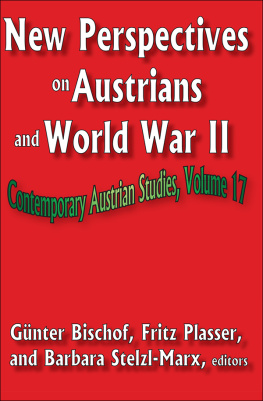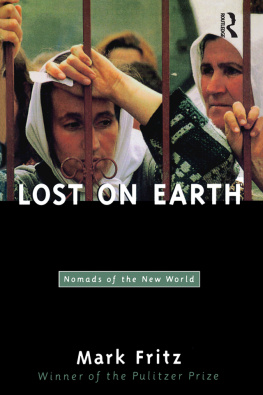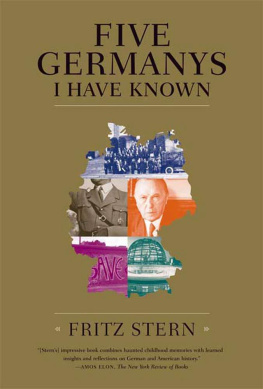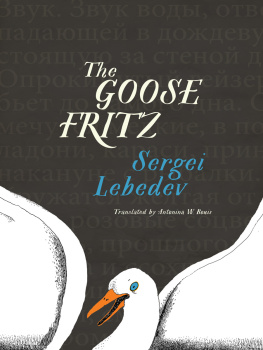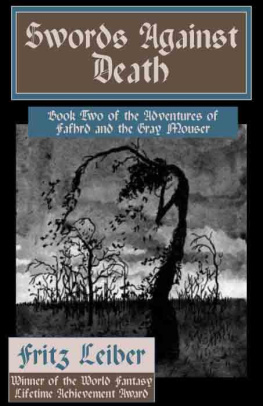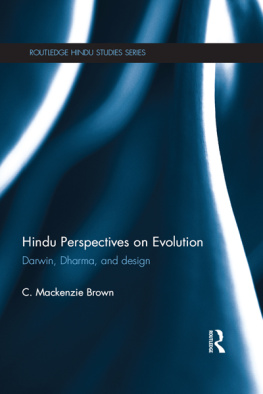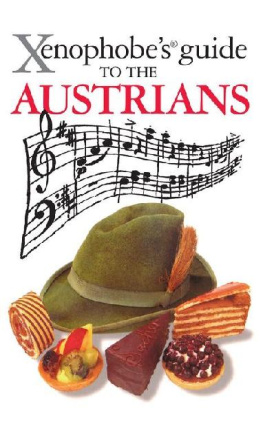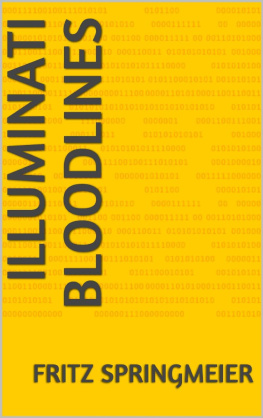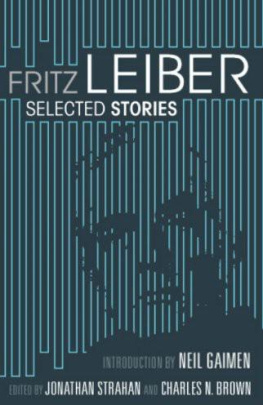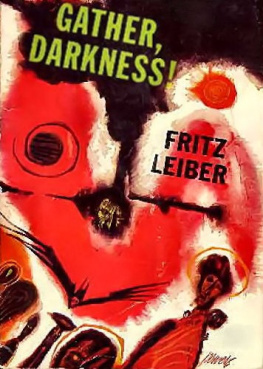New Perspectives on Austrians and World War II
Contemporary Austrian Studies
Sponsored by the University of New Orleans and Universitt Innsbruck
Editors
Gnter Bischof, CenterAustria, University of New Orleans
Fritz Plasser, Universitt Innsbruck
Production Editor
Ellen Palli
Universitt Innsbruck
Copy Editor
Jennifer Shimek
Loyola University, New Orleans
Assistant Editor
Marion Wieser
UNO/Innsbruck
Executive Editors
Franz Mathis, Universitt Innsbruck
Susan Krantz, University of New Orleans
Advisory Board
Siegfried Beer
Universitt Graz
Peter Berger
Wirtschaftsuniversitt Wien
John Boyer
University of Chicago
Gary Cohen (ex officio)
Center for Austrian Studies
University of Minnesota
Christine Day
University of New Orleans
Oscar Gabriel
Universitt Stuttgart
Reinhard Heinisch
University of Pittsburgh
Pieter Judson
Swarthmore College
Wilhelm Kohler
Universitt Tbingen
Helmut Konrad
Universitt Graz
Sndor Kurtn
Corvinus University Budapest
Gnther Pallaver
Universitt Innsbruck
Peter Pulzer
Oxford University
Oliver Rathkolb
Universitt Wien
Sieglinde Rosenberger
Universitt Wien
Alan Scott
Universitt Innsbruck
Franz Szabo (ex officio)
Wirth Institute for Austrian and Central
European Studies University of Alberta
Heidemarie Uhl
Austrian Academy of Sciences
Ruth Wodak
University of Lancaster
Publication of this volume has been made possible through generous grants from the Austrian Ministry of European and International Affairs through the Austrian Cultural Forum in New York as well as the Ministry of Science and Research. The Austrian Marshall Plan Anniversary Foundation in Vienna has been very generous in supporting CenterAustria at the University of New Orleans and its publications series. The College of Liberal Arts at the University of New Orleans and the Auslandsamt of the University of Innsbruck provided additional financial support, as did the Cultural Office of the City of Innsbruck.
New Perspectives on Austrians and World War II
Contemporary Austrian Studies, Volume 17
Gnter Bischof, Fritz Plasser, and Barbara Stelzl-Marx, editors
First published 2009 by Transaction Publishers
Published 2017 by Routledge
2 Park Square, Milton Park, Abingdon, Oxon OX14 4RN
711 Third Avenue, New York, NY 10017, USA
Routledge is an imprint of the Taylor & Francis Group, an informa business
Copyright 2009 by Taylor & Francis.
All rights reserved. No part of this book may be reprinted or reproduced or utilised in any form or by any electronic, mechanical, or other means, now known or hereafter invented, including photocopying and recording, or in any information storage or retrieval system, without permission in writing from the publishers.
Notice:
Product or corporate names may be trademarks or registered trademarks, and are used only for identification and explanation without intent to infringe.
Library of Congress Catalog Number: 2008051225
Library of Congress Cataloging-in-Publication Data
New perspectives on Austrians and World War II / Gnter Bischof, Fritz Plasser, and Barbara Stelzl-Marx, editors.
p. cm. -- (Contemporary Austrian studies ; v. 17)
Includes bibliographical references and index.
ISBN 978-1-4128-0883-5 (alk. paper)
1. Austria--History--1938-1945. 2. World War, 1939-1945--Austria. I. Bischof, Gnter, 1953- II. Plasser, Fritz, 1948- III. Stelzl-Marx, Barbara.
DB99.N39 2009
940.53436--dc22
2008051225
ISBN 13: 978-1-4128-0883-5 (pbk)
Table of Contents
Gerhard L. Weinberg
It is not surprising that in the vast literature on the European theater of World War II the material on Nazi Germany in English has paid relatively little attention to developments in Austria and how the war affected Austrians with the exception of a few relatively narrow aspects. In terms of population, annexed Austria represented approximately 10 percent of Germanys wartime population, and most have therefore concentrated their attention on the other 90 percent. The situation of Austria has, however, not been neglected entirely. There have been studies of the decision of the Allies to insist on the restoration of Austrias independence, on the fighting in Austria in the very last stage of the war, and on the division of Austria into occupation zones. The emphasis in English language publications has been on Germany as a whole with any regional studies more likely to be focused on such areas as Bavaria, Thuringia, and other older German units as well as on the areas that were turned over to Poland and the Soviet Union in 1945. It is under these circumstances especially useful for those interested in the history of the war and of modern Europe in general to have a collection of pieces dealing with Austria and Austrians in English, especially pieces that rely heavily on publications and archives in German.
In Austria itself, Austrians had long viewed the war years as an especially dramatic burden during which the country endured its sad status as victim of the nasty German Nazis. This volumes introductory survey by Oliver Rathkolb illuminates this aspect and shows how a series of incidents involving Austrians with especially dirty records contributed to a new look at the past, one that some historians had begun to examine seriously earlier but without much wider impact. Without any doubt, as the studies of the participation of Austrians in the German armed forces by Richard Germann and Thomas Grischany show, once a number of officers of the pre-annexation Austrian army had been purged, the generals, officers, and men from Austria were easily and essentially totally integrated into the military apparatus of the Third Reich. Happy about opportunities for promotion and travel, pleased to be part of an effective and victorious force in the early stages of the war, they did their part and expected to continue to do so into the indefinite future. Whether called upon to participate in fighting or atrocities, in holding difficult positions or looting, officers and soldiers from Austria could be depended upon to resemble those from other parts of Nazi Germany. They might hate the Italians after they surrendered even more than their fellow soldiers, but they shared the general outrage over the fact that, contrary to expectation and belief, bombs were not dropped only by Germans on the cities of Germanys enemies. Although several authors cite the essential book on German military deaths in the war by Rdiger Overmans, they do not engage one of his most interesting findings. Although not employed disproportionately on any one front, the soldiers from Austria suffered a substantially lower percentage of losses than those from the rest of Germany. The explanation for this important finding remains to be discovered.
While the article by Barbara Stelzl-Marx on military resistance in Vienna in the last weeks of the war illustrates the confused situation there in the final weeks of the war, Stefan Karners account of Soviet organizations, policies, and practices in regard to prisoners of war offers no separate analysis of Austrian soldiers that fell into Soviet hands. The issue of any separate treatment and release policy for soldiers from Austria needs further investigation.


